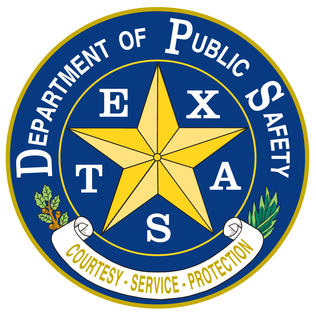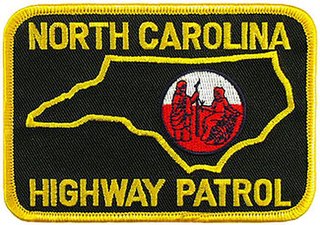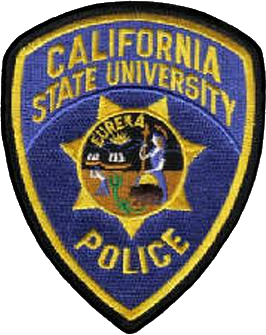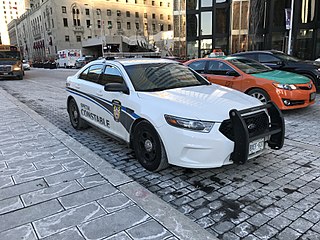Marshal is a term used in several official titles in various branches of society. As marshals became trusted members of the courts of Medieval Europe, the title grew in reputation. During the last few centuries, it has been used for elevated offices, such as in military rank and civilian law enforcement.
Railroad police or railway police are people responsible for the protection of railroad properties, facilities, revenue, equipment, and personnel, as well as carried passengers and cargo. Railroad police may also patrol public rail transit systems.

Security police usually describes a law enforcement agency which focuses primarily on providing security and law enforcement services to particular areas or specific properties. They may be employed by governmental, public, or private institutions. Security police are generally considered distinct from security guards as security police personnel typically hold some level of law enforcement authority. The exact powers held by security police vary widely between jurisdictions. Examples of these types of agencies include the United States' DoD Police and FBI Police, the Indian Central Industrial Security Force, and the British Civil Nuclear Constabulary.
Special police usually describes a police force or unit within a such an agency whose duties and responsibilities are significantly different from other forces in the same country or from other personnel within the same agency, although there is no consistent international definition. Generally, special police personnel hold some level of police powers; sometimes they hold the same powers and authority of other law enforcement officers within their jurisdiction, but at a minimum they will typically possess detainment and arrest authority. 'Special police' is also occasionally used when referring to an 'elite' law enforcement agency or unit, such as special weapons and tactics (SWAT) units or other similar paramilitary forces who have some level of police power. 'Special police' may also be used to describe individuals who are granted police powers incidental to their primary duties, such as welfare fraud investigators, certain security guards, child welfare investigators, and agricultural inspectors. Special police personnel may be armed or unarmed.

The Department of Public Safety of the State of Texas, commonly known as the Texas Department of Public Safety (DPS), is a department of the state government of Texas. The DPS is responsible for statewide law enforcement and driver license administration. The Public Safety Commission oversees the DPS. However, under state law, the Governor of Texas may assume command of the department during a public disaster, riot, insurrection, formation of a dangerous resistance to enforcement of law, or to perform his constitutional duty to enforce law. The commission's five members are appointed by the governor and confirmed by the Texas Senate, to serve without pay for staggered, six-year terms. The commission formulates plans and policies for enforcing criminal, traffic and safety laws, preventing and detecting crime, apprehending law violators, and educating citizens about laws and public safety.

The Federal Protective Service (FPS) is a federal law enforcement agency of the United States Department of Homeland Security (DHS). It is also "the federal agency charged with protecting and delivering integrated law enforcement and security services to facilities owned or leased by the General Services Administration (GSA)"—over 9,000 buildings—and their occupants.

The United States Capitol Police (USCP) is a federal law enforcement agency in the United States with nationwide jurisdiction charged with protecting the United States Congress within the District of Columbia and throughout the United States and its territories. It answers to the Capitol Police Board and is the only full-service federal law enforcement agency appointed by the legislative branch of the federal government of the United States.

The secretary of state of Illinois is one of the six elected executive state offices of the government of Illinois, and one of the 47 secretaries of state in the United States. The Illinois secretary of state keeps the state records, laws, library, and archives, and is the state's corporation registration, vehicle registration and driver licensing authority. The current secretary of state is Alexi Giannoulias, a Democrat who took office in 2023.

The North Carolina State Highway Patrol (NCSHP) is the highway patrol agency for North Carolina which has no per-se "state police" agency. The Patrol has jurisdiction anywhere in the state except for federal or military installations and on the Cherokee Indian Reservation or on Cherokee outlying lands in the western mountains. NCSHP personnel at times conduct formations, inspections, honor guard activities. The primary mission of the North Carolina State Highway Patrol is to ensure safe and efficient transportation on the streets and highways, reduce crime, protect against terrorism, enforce motor vehicle laws, and respond to natural and man-made disasters.

The Pennsylvania State Capitol Police is a section of the Pennsylvania Department of General Services providing law enforcement, security and parking enforcement services to the State Capitol Complex in Harrisburg, and at state government office buildings in Philadelphia, Pittsburgh, and Scranton, Pennsylvania. Their jurisdiction is primarily state owned buildings and property on the Capitol Complex. The Capitol Police jurisdiction extends to several state owned buildings throughout the city of Harrisburg and local townships.

The California State University police departments(CSUPD) (known within the California State University system as the Cal State Police or University Police) are the police departments of the California State University system. Their police officers are duly sworn peace officers of the State of California, as established by section 830.2(c) of the California Penal Code. There are a total of 23 campuses in the California State University system, each with their own police department. Each campus' police department has its own chain of command; however, some of the policies are system-wide.

Sheriffs In the United States are the chief of law enforcement officers of a county. Sheriffs are usually either elected by the populace or appointed by an elected body.

The Florida Department of Law Enforcement (FDLE) is a state-wide investigative law enforcement agency within the state of Florida. The department formally coordinates eight boards, councils, and commissions. FDLE's duties, responsibilities, and procedures are mandated through Chapter 943, Florida Statutes, and Chapter 11, Florida Administrative Code. FDLE is headed by a commissioner who reports to the Florida Cabinet, which is composed of the governor, the attorney general, the chief financial officer, and the commissioner of agriculture. The commissioner is appointed to his position by the governor and cabinet and confirmed by the Florida Senate.

In the United States, the state police is a police body unique to each U.S. state, having statewide authority to conduct law enforcement activities and criminal investigations. In general, state police officers or highway patrol officers, known as state troopers, perform functions that do not fall within the jurisdiction of a county’s sheriff, such as enforcing traffic laws on state highways and interstates, overseeing security of state capitol complexes, protecting governors, training new officers for local police forces too small to operate an academy and providing technological and scientific services. They also support local police and help to coordinate multi-jurisdictional task force activity in serious or complicated cases in states that grant full police powers statewide.
A private police force, or private police department, in the United States is a law enforcement agency that is:

A special constable or special police constable can refer to an auxiliary or part-time law enforcement officer or a person who is granted certain (special) police powers.

The North Carolina General Assembly Police is a security police agency responsible for law enforcement and security of the North Carolina General Assembly buildings in Wake County, North Carolina, United States. The agency is separate from the North Carolina State Capitol Police

The Maine Capitol Police is the capitol police agency of the state of Maine responsible for policing the Maine State House, the state capitol, and other state agency buildings, grounds and properties in the state. Capitol Police officers are located at the Capitol Complex, but have statewide jurisdiction where required.













